2012 Research Seminars
Philosophy Seminars | ||
|---|---|---|
Centre for Writing and Society & Philosophy @ UWS | ||
Time: 2-4pm / Place: Bankstown Campus, 3.G.55 |
Douglas Moggach (UToronto), "Marx and German Idealism" (31st October)
Research Chair in Political Thought, University of Ottawa
Time: 31 October 2.00 - 4.00 pm
Venue: UWS Bankstown Campus, 3.G.55
Abstract:
My task is to examine the philosophical relations between the thought of Karl Marx and the German Idealist tradition, primarily Hegel, but also Kant and Fichte, with reference as well to the foundational importance of Leibniz. The paper will explore ideas of labour and freedom in Marx, relative to his German Idealist background. The study will be historical, tracing filiations and influences in the manifold receptions of idealism, but will also indicate areas of contemporary relevance.
Marx's conception of labour takes up elements of the German idealist tradition, especially ideas of spontaneity and self-formation deriving from Leibniz' critique of mechanistic materialism. These ideas are further developed under the influence of Kantian practical reason, with its stress on autonomy. Following Fichte, Marx links spontaneity and autonomy with labour, and interrogates the concrete conditions for the practice of autonomy. Following Hegel, and the reception of Hegel by his leftist students, Marx seeks to uncover the dynamics and inner contradictions definitive of the modern world, with its specific notions of subjectivity, civil society, and state, and to produce an account of its determinate negations. Marx's relations with the Hegelian School will be traced through the problematic of post-Kantian perfectionism in its various forms. Marx's writings on politics and philosophy in the Vormärz period of the 1840's (the initial but not the exclusive focus of this study) possess a thematic unity, combining a philosophical anthropology and a perfectionist ethic with a critique of the modern state. Marx's later writings undertake what has been called a second appropriation of Hegel in the logic of Capital. My argument will be that the shift to naturalistic and scientistic accounts of history and agency in Engels and later official Marxism, where the idealist heritage is bowdlerized or explicitly rejected, was to a limited extent prefigured in the ethical theory of the young Marx himself, insofar as his perfectionism entailed a problematic synthesis of Kantian with Aristotelian elements. The latter tended to naturalise the subject, by subsuming it under predetermined ends (even if these are conceived as historical rather than as permanently fixed), thus undermining the Kantian sense of free self-determining spontaneous action. This is not to equate Aristotelian eudaimonia with subsequent naturalistic accounts, but to argue that Marx's incomplete assimilation of Kant left open a theoretical space to be filled by heterogeneous ideas. The task is not to trace all these divergences, but to focus on the express or contested idealist heritage in selected Marxist currents. The subsequent retrieval by the Frankfurt School of certain Kantian elements in Marx remains partial and problematic, insofar as the concept of spontaneity is undertheorised; or it is divorced from its intimate connection with labour, which is central to Marx's own project. Here I will draw on my previous work on Marx and Habermas, as well as more recent work on Feuerbach, who shares some of Marx's problematic relations to idealism.
Biography:
Douglas Moggach holds the Research Chair in Political Thought at the University of Ottawa. He is the recipient of a Canada Council Killam Research Fellowship. Among his publications are The New Hegelians (Cambridge, 2006); Reason, Universality, and History (with Manfred Buhr, Ottawa, 2004); The Philosophy and Politics of Bruno Bauer (Cambridge, 2003); Bruno Bauer: Über die Prinzipien des Schönen. De pulchri principiis (with Winfried Schultze, Berlin, 1996); and (with Paul Leduc Browne), The Social Question and the Democratic Revolution: Marx and the Legacy of 1848 (Ottawa, 2000). He is currently working on the Hegelian school, republican thought, and the history of aesthetics.
Diego Bubio, "Kant's Sacrificial Turns" (24th October)
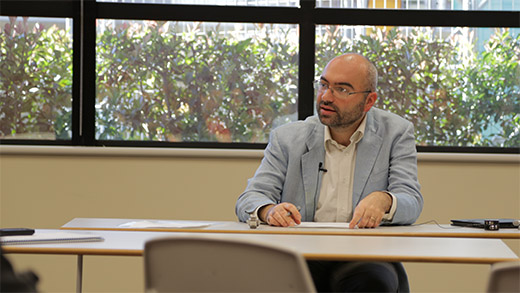
Senior Lecturer / ARC Future Fellow
School of Humanities and Communication Arts
University of Western Sydney
Time: October 24, 2.00 pm - 4.00 pm
Place: UWS Bankstown Campus, 3.G.55
Abstract:
This paper addresses the role of the notion of sacrifice in Kant's theoretical philosophy, practical philosophy, and in his account of religion. First, I argue that kenotic sacrifice, or sacrifice as 'withdrawal', plays a hidden and yet important role in the development of Kant's transcendental philosophy. Second, I focus on Kant's practical philosophy, arguing that the notion of sacrifice that is both implied and explicitly analysed by Kant is mainly suppressive sacrifice. However, Kant's account is fundamentally ambiguous, as sometimes the kenotic meaning of sacrifice seems to resurface, especially in the context of Kant's discussion of the happiness of others as an end in itself. Because religious notions are regarded by Kant as necessary transitional forms (Darstellungen) to be used to make moral ideas applicable to the world, I then scrutinise Kant's view of sacrifice as an improper symbol, and I analyse Kant's arguments for such a dismissal and discuss the subject matter in recent literature. Finally, I examine the role of sacrifice in Kant's account of Christ as the prototype of pure moral disposition. I conclude by arguing that Kant indeed grasped the importance of including kenotic dynamics in practical philosophy but was somehow unable or unwilling to integrate it into the formal grounding of his ethics. This tension, however, effectively provides an entry point for features that can be found in the post-Kantians.
Biography:
Diego Bubbio has a PhD from the University of Turin (Italy). Before coming to UWS, Diego Bubbio was a postdoctoral fellow in the Department of Philosophy at The University of Sydney, where he co-directed (with Paul Redding) the Religion and Post-Kantian Philosophy Research Cluster. He also taught Kant and Modern philosophy at the University of Aberdeen. He currently is an ARC Future Fellow in the School of Humanities and Communication Arts. Diego Bubbio's research is mainly in the area of post-Kantian philosophy. In particular he is interested in the relationship of the post-Kantian tradition (from Kant to Nietzsche) to the later movements of European philosophy, such as existentialism and hermeneutics, and in issues in philosophy of religion. His key publications consider the notion of sacrifice. Along with two monographs in Italian and a number of chapters in books, he has articles published in academic journals such as The British Journal for the History of Philosophy, International Journal of Philosophical Studies, International Journal for Philosophy of Religion, and Heythrop Journal. He has edited, with Philip Quadrio, the collection The Relationship of Philosophy to Religion Today (Cambridge Scholars Publishing 2011) and, with Paul Redding, Religion After Kant: God and Culture in the Idealist Era (Cambridge Scholars Publishing 2012). He is also the editor of Luigi Pareyson's Existence, Interpretation, Freedom. Selected Writings (The Davies Group Publishers 2009). His current ARC-funded project is an analysis of the notion of the 'I' in Hegel and Heidegger.
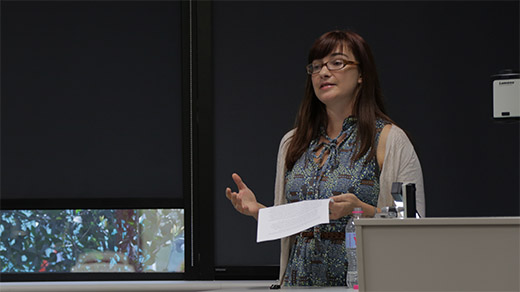
Vice-Chancellor's Postdoctoral Research Fellow in Philosophy
University of New South Wales
Title : Black Swan: Cracked Porcelain and Becoming-Animal
Time : October 10, 2.00 pm - 4.00 pm
Place : UWS Bankstown Campus, 3.G.55
Abstract : The 2010 film Black Swan, directed by Darren Aronofsky, provides a fruitful context for thinking about Deleuze's conceptualisation of structural transformation as a 'presubjective' process involving a critical and creative politics of engagement. Nina is a young dancer who has just secured the lead role in the New York Ballet's new production of Swan Lake. This role not only requires her to dance the pure and innocent character of the 'white swan' - a role that mirrors Nina's character in real life, and for which she is well suited - but also as the seductive and darkly erotic character of the 'black swan', a role quite alien to Nina. The film traces Nina's desperate efforts to meet the demands of this doubled characterisation. Through new forms of engagement with her peers, she enters into a 'becoming-swan' that frees her from the restraints and constraints imposed by her existing self. While this transformative process enables her to realise aesthetic perfection in her art, this comes at a heavy price: Nina not only is creatively destabilised, but ultimately is destroyed by the transformation she endures. By considering this work of cinema in light of Deleuze's writings on 'becoming-animal' and 'Porcelain and Volcano', this paper reflects on a crucial question underlying much of Deleuze's political thought: how is it possible to privilege radical subjective and social transformation, without these structures of necessary coherence also 'cracking up' and being destroyed in the process?
Biography : Simone Bignall is Vice-Chancellor's Postdoctoral Research Fellow in Philosophy at the University of New South Wales in Sydney, Australia. She is the author of Postcolonial Agency: Critique and Constructivism (2010), which conceptualises postcolonial transformations in terms of Deleuze's philosophy of difference and desire. She is co-editor of Deleuze and the Postcolonial (with Paul Patton, 2010) and of Agamben and Colonialism (with Marcelo Svirsky, 2012), all published by Edinburgh University Press.
To listen to this paper use the audio player below. You can also download the audio onto your computer.
James Phillips (UNSW), "Jean-uc Nancy's Fraternal First Philosophy of the 'With': Rethinking Communion" (26th September)
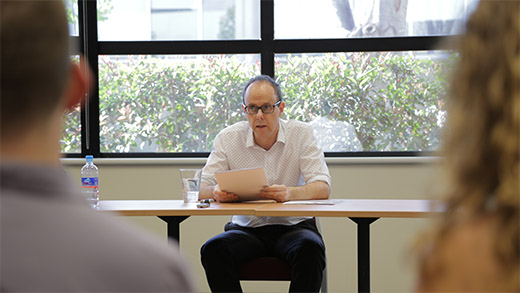
Presenter : James Phillips
Title: Jean-Luc Nancy's Fraternal First Philosophy of the 'With': Rethinking Communion
Abstract:
Jean-Luc Nancy's philosophical writings present an extended meditation on the meaning and possibility of community. Revisiting ontology's question of the relationship between the many ways of Being, Nancy defines community by the communication/equivocation of the ways of Being rather than a common substance. Nancy names this community of Being "with" and resists the traditional pull in ontology, from Aristotle to Heidegger, to uncover the unity of analogy of the different ways of Being. The different ways of Being are with one another, and it is "with" that preserves the differences in their relations. Nancy's community of "with" is a community without a unifying point of indifference, a fraternal community of family resemblances without a father. First philosophy here is immediately social, and Nancy offers the one critique of both ontology and sociology. Heidegger's fundamental ontology and Freud's speculations on the originary community of the primal horde both conceal and reveal what, for Nancy, is the community without a shared substance. It is, however, ontology and Nancy's critical relationship to it that informs his conception of community: objections that Nancy's position is apolitical and ethically ambiguous take insufficient notice of the different task that he has set himself.
Biography:
James Phillips is Senior Lecturer in Philosophy at the University of New South Wales. His research interests lie in the areas of aesthetics, political philosophy, phenomenology and the philosophical dimensions of literary texts. He is the author of Heidegger's Volk: Between National Socialism and Poetry (Stanford UP, 2005) and The Equivocation of Reason: Kleist Reading Kant (Stanford UP, 2007). He has also edited a book on cinema.
To listen to this paper use the audio player below. You can also download the audio onto your computer.
Peg Birmingham (Depaul), "Revolutionary Declarations: État du droit and the droit de l'opposition" (3rd September)
Presenter: Peg Birmingham
Abstract: More often than not the two revolutionary declarations of the eighteenth century—the US Declaration of Independence and the French Declaration of the Rights of Man and the Citizen—are grouped together under what is usually referred to as "the great declarations." I want to suggest in my lecture that this conflation of the two declarations has spawned a number of critiques, from Marx and Burke to Badiou and Wendy Brown, that dismiss the universality of human rights as in fact nothing other than the rights of citizens understood as egoistic, bourgeois individuals who are at the beck and call of state power. Indeed, according to these critiques, it is not at all surprising that the modern rights discourse has moved today from human rights to humanitarian rights in which the state, in the name of right, intervenes on behalf of suffering victims (not citizens) who seemingly need the protection of the more powerful sovereign state. I want to argue here that while these critiques find a foundation in the US declaration of independence, which I argue is a declaration of the right of a new sovereign state, they miss completely the revolutionary aspect of the French declaration, specifically the 1793 version, wherein the universal rights of man and the citizen emerge in a declaration of the right to oppose state sovereignty. In my remarks I am going to examine the difference between the "state of right" and the "right of opposition," attempting to flesh out the significance this difference has for thinking democracy and human rights today.
Bio: Peg Birmingham is Professor of Philosophy at DePaul University. She is author of Hannah Arendt and Human Rights: The Predicament of Common Responsibility. She is presently working on a manuscript titled Hannah Arendt and Political Glory: Bearing the Unbearable.
To listen to this paper use the audio player below. You can also
Vanessa Lemm (UNWS), Cancelled - "The posthumous in Derrida, Sartre and Nietzsche" (29th August)
Cancelled
Dalia Nassar (Syd), "Goethe and Enironmental Philosophy" (15th August)
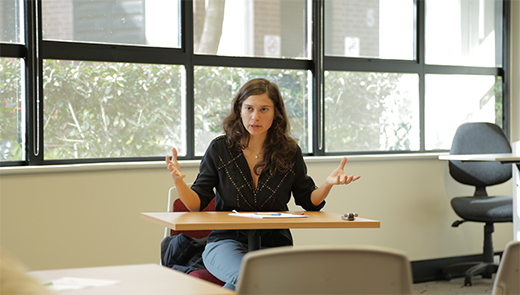
Presenter: Dalia Nassar
Abstract:
Given the increased interest in Goethe's study of nature, and the rise of environmental philosophy, it seems timely to consider the relevance of Goethe's thought in relation to contemporary environmental questions and concerns. Can Goethe's approach to and understanding of nature contribute to contemporary questions and concerns? The goal of this paper is to answer this question. The paper will be divided into four sections. In the first, I consider the critiques which contemporary environmental philosophy levels against romantic nature philosophy (in which Goethe is often included). Section two will assess the validity of these critiques in light of Goethe's understanding of nature. The third section will elaborate an essential problem within environmental philosophy. The final section will be an exploration of the ways in which Goethe's approach to understanding the natural word, and in particular his conceptions of the whole-part relation, can provide a distinctive response to the fundamental difficulty I locate in contemporary environmental thought.
Bio:
Dalia Nassar is assistant professor of philosophy at Villanova University (USA) and DECRA Research Fellow at the University of Sydney. Her article, "From a Philosophy of Self to a Philosophy of Nature: Goethe and the Development of Schelling's Naturphilosophie" won the prize for best essay published in 2010 on Goethe and/or his time, awarded by the Goethe Society of North America. She is editor of a collection of essays titled "German Romantic Philosophy: The Relevance of Early Romanticism," forthcoming with OUP, and has completed a book titled "The Romantic Absolute."
Kiarina Kordela (Macalaster), "Gaze, or, The Limit to Boundary" (1st August)
Presenter: A. Kiarina Kordela
Abstract:
The title's pun on Kant's notorious distinction between limit (Schranke) and boundary (Grenze) means to indicate that the gaze is a function that renders any boundary—the marker of the difference between something and its other—unlimited, that is, incapable of finding completion. This analogy to Kant, however, ends here, as the way in which the gaze corrodes boundaries—to the point, in fact, that the distinction (boundary) between self and other collapses—is not that of the limit, understood in the Kantian sense of an indefinite progress in the series of experience. More relevant to the gaze's 'limitations' are rather concepts such as Deleuze's "out-of-field" or Sartre's "body" and Lacan's the "gaze." Instead, however, of engaging in a direct dialogue with the above thinkers, in this talk I will focus on the exemplary unraveling of the structure of the gaze, as the inherent condition of the boundary's impossibility, presented in Jean-Luc Godard and Anne-Marie Miéville's Ici et ailleurs ("Here and Elsewhere"; 1976). In spite of all relevant footage, the film goes far beyond the specific historical event of the Palestinian revolution of 1970 to suggest that one's "heres" and "elsewheres" are very complex aggregates whose dimensions range from space, time, and one's geo-political position within a mediatized capitalist world, to language, habit, desire, and above all, the interplay between the boundary of gender and the gaze that corrodes it. This interplay permeates all other boundaries staged in Here and Elsewhere as a form of their primary matrix, thereby rendering difficult to define the title's et/and that is supposed to express the relation between "here" and "elsewhere." It is ultimately as an essay on Et/And that Godard and Miéville's film remains timely and central to discussions on topics that range from any specific difference to ontology itself.
Bio:
A. Kiarina Kordela is professor of German and director of the Critical Theory Program, at Macalester College, and honorary adjunct professor at the University of Western Sydney, Australia. She is the author of $urplus: Spinoza, Lacan (SUNY Press, 2007), Being, Time, Bios: Capitalism and Ontology (SUNY Press, forthcoming 2013), and co-editor, with Dimitris Vardoulakis, of Freedom and Confinement in Modernity: Kafka's Cages (Palgrave-Macmillan, 2011). She has published on a wide range of topics in several collections and journals, including Angelaki, Cultural Critique, Political Theory, Parallax, Rethinking Marxism, and Umbr(a). Her "Biopolitics: Transhistorically and Historically" is forthcoming in Differences. To listen to this paper use the audio player below. You can also download the audio onto your computer.
Peter Gratton (Newfoundland), "Spinoza and the Biopolitical Roots of Modernity" (4th July)
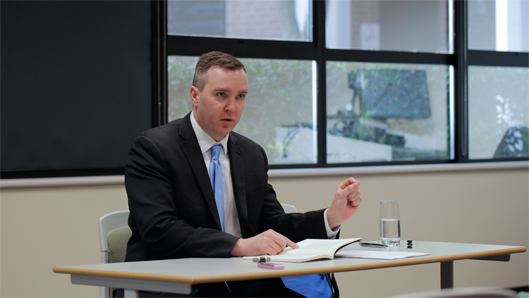
Presenter: Peter Gratton (Memorial University of Newfoundland)
Abstract: Much has been written about bio-political sovereignty in the wake of Giorgio Agamben's work, which relies, at least in the first volume of Homo Sacer, on Carl Schmitt's transcendental account of sovereignty. I will argue, however, that Foucault and Arendt rightly identify what Derrida once called the "changing shape and place of sovereignty" in modernity, which for them is horizontal and disseminated within a presupposed nation. For this reason, we will look to the source of modern philosophical immanentism, Spinoza, to show that he is not extrinsic to this modern bio-politics, and demonstrates how the sovereign exception and its nationalized version work hand-in-glove in the era of which he was a part. In this way, we argue that it is Spinoza's political theology, not Schmitt's, that is the better pass-key to what Foucault and Arendt identify as biopolitical. By doing so, I put in tension two trends in recent Continental philosophy--philosophical vitalism and the critique of biopolitics--while raising questions about the use of political, if not ontological, forms of immanence.
Bio: Peter Gratton is a professor of Philosophy at the Memorial University of Newfoundland. He has published widely in political, Continental, and intercultural philosophy and is the author of The State of Sovereignty: Lessons from the Political Fictions of Modernity (SUNY Press, 2012) and Speculative Realism (Continuum, forthcoming). Co-Editor of the influential interdisciplinary journal Society and Space, executive board member of the North American Sartre Society and other national philosophical societies, and area editor for Africana philosophy for the Internet Encyclopedia of Philosophy, Peter has also edited Traversing the Imaginary (Northwestern University Press, 2007), co-edited with John Mannousakis, and Jean-Luc Nancy and Plural Thinking: Expositions of World, Politics, Art, and Sense (SUNY Press, 2012), co-edited with Marie-Eve Morin. Peter is currently a Research Fellow in the Humanities Centre at Australia National University.
To listen to this paper use the audio player below. You can also download the audio onto your computer.
Peter Banki, "Love, Non-Understanding and Irony in the work of Friedrich Schegel" (Postponed)
Postponed
Stathis Gourgouris (Columbia), "An Arche for Radical Democracy" (28th May)
Presenter: Stathis Gourgouris
Abstract:
An examination of the notion of archē in ancient Greek thought, from its initial appearance as a philosophical concept in the Anaximander fragment to its political uses in Aristotle and Herodotus, as a way of arguing for democracy's quintessential an-archic character.
Bio:
Stathis Gourgouris is Director of the Institute for Comparative Literature and Society, Columbia University, author of Dream Nation (1996) and Does Literature Think? (2003), and editor of Freud and Fundamentalism (2010).
To listen to this paper use the audio player below. You can also download the audio onto your computer.
Citations provided in seminar: Έστι τις αρχή καθ' ήν άρχει των ομοίων τω γένει και των ελευθέρων (ταύτην γαρ λέγομεν είναι την πολιτικήν αρχήν), ήν δει τον άρχοντα αρχόμενον μαθείν
"There is a sort of rule pertaining to those similar in birth and free – this we call political rule – where the ruler learns by being ruled." [Politics, Book III, 1277b, 8-10]
-----
Anaximander fragment
Ἀναξίμανδρος μἐν Πραξιάδου Μιλήσιος Θαλοῦ γενόμενος διάδοχος καὶ μαθητὴς ἀρχήν τε καὶ στοιχεῖον εἴρηκε τῶν ὄντων τὸ ἄπειρον, πρῶτος τοῦτο τοὔνομα κομίσας τῆς ἀρχῆς. λέγει δ' αὐτὴν μήτε ὕδωρ μήτε ἄλλο τι τῶν καλουμένων εἶναι στοιχείων, ἀλλ' ἑτέραν τινὰ φύσιν ἄπειρον, ἐξ ἧς ἅπαντας γίνεσθαι τοὺς οὐρανοὺς καὶ τοὺς ἐν αὐτοῖς κόσμους· ἐξ ὧν δὲ ἡ γένεσίς ἐστι τοῖς οὖσι, καὶ τὴν φθορὰν εἰς ταῦτα γίνεσθαι κατὰ τὸ χρεών· διδόναι γὰρ αὐτὰ δίκην καὶ τίσιν ἀλλήλοις τῆς ἀδικίας κατὰ τὴν τοῦ χρόνου τάξιν, ποιητικωτέροις οὕτως ὀνόμασιν αὐτὰ λέγων.
Among those who say that the first principle [archē] is one and movable and infinite, is Anaximander of Miletus, son of Praxiades, pupil and successor of Thales. He said that the first principle [archē] and element of all things is infinite [apeiron], and he was the first to apply this word to the first principle; and he says that it is neither water nor any other one of the things called elements, but the infinite is something of a different nature, from which came all the heavens and the worlds in them; and from which things are generated in their substance and to which they return of necessity when they degenerate [ex ōn de ē genesis esti tois ousi kai tēn phthoran eis tauta ginesthai kata to chreōn]; for he says that they suffer retribution [dikēn] and give recourse [tisin] to one another for injustice [adikian] according to the order of time [kata tou chronou taxin], putting it rather poetically [poiētikoterois outōs onomasin auta legōn].
------
πολίτης δ' απλώς ουδενί των άλλων ορίζεται μάλλον ή τω μετέχειν κρίσεως και αρχής
"A citizen is simply determined, above all other matters, in sharing/participating in judgment [krisis] and rule [archē]", (Aristotle, Politics, Book III, 1275a, 22-25)
-----
ούτε άρχειν ούτε άρχεσθαι εθέλω
"I want neither to rule nor to be ruled" (Herodotus, Histories, Book III, 80-84]
Robyn Ferrell, Cancelled (16th May)
Paul Alberts, "An Ecocritical Self: Begining with Crusoe" (2nd May)
Presenter: Paul Alberts
Abstract:
This paper aims to contribute to the relatively new field of ecocriticism, which is still developing from a relatively narrow base of appreciating 'nature writing' into more critical directions of textual analysis, which aim (broadly) to consider the relationship of the human to the nonhuman against a contemporary background of perceived ecological crisis. Some framing propositions and questions on how this relationship might be important to the textual domain of modern prose narrative will lead to an analysis of Robinson Crusoe, often positioned as amongst the very first modern novels. Robinson is a character oriented in two directions, outwardly as a lone individual in an inhospitable wilderness; inwardly, as a suffering subject engaged in self-appraisal. Critical reception has focused on thematizing both these dimensions, but they unarguably interrelate as Robinson 'builds' both his island civilization and a repentant self. Relations with the island, its creatures, then other humans are presented through early-modern and classic European tropes, but this paper will explore how the narrative articulates a version of the properly human through a confabulation of the ecological, the inanimate and the human other.
Bio:
Paul Alberts teaches in philosophy at the University of Western Sydney. He is interested in both developing continental philosophical approaches to environmental issues, and promoting the integration of ecological awareness in philosophy. He has recently published on the Anthropocene, and has contributions to anthologies on Foucault and Kafka appearing later in 2012.
To listen to this paper use the audio player below. You can also download the audio onto your computer.
John Hadley, "Pain, Death, and Concern for Animal Life" (18th April)
Presenter: John Hadley
Abstract:
The focus of this presentation is moral epistemology in animal ethics, specifically, how we come to know whether animals are harmed when they are confined or painlessly killed. In contrast to orthodox approaches which answer the question with exclusive reference to animal mental states, I address the question with reference to public concern for animals—a concern that is supposed to be reflected in prevailing pain-focused animal protection institutions (animal welfare and animal cruelty legislation and norms).
I will argue that when lay people register concern for animals by using specific moral terms, they are expressing a concern for animal pain that goes beyond a concern for simply how pain actually feels 'on the inside'. My argument is that if the phenomenology of an animal's pain matters, then this suggests that its life and the kind of life it leads are also appropriate topics for deliberation. Thinking about concern for pain in this new expansive way entails that the rationale and implications of pain-focused institutions are likewise broadened to include death and confinement.
My relational approach to the harm of death and confinement is an element in a theory of animal ethics I call insurgent amelioration. Insurgent amelioration is pragmatist insofar as it aims to reform rather than revolutionise by identifying scope for progress within existing institutions and norms. The focus on institutions as the site of moral progress marks insurgent amelioration as consistent with the feasibility approach to deliberative democracy recently advanced by Bohman. My focus on ordinary valuing practices, particularly the moral vocabulary people employ when they register concern for animal pain, suggests the paper can be read as a practical application of the kind of New Pragmatism advanced by Macarthur and Price.
Bio:
John Hadley is Research Lecturer in Philosophy in the School of Humanities and Communication Arts at University of Western Sydney. He was formerly a lecturer in philosophy in the School of Humanities and Social Sciences, and Lecturer in Communication Ethics in the School of Communication, at Charles Sturt University. During his PhD candidature at the University of Sydney, John lectured in the philosophy department and was a guest lecturer for USYD Laboratory Animal Services. He has published on a wide range of topics in animal and environmental ethics, including recent papers on assisting wild animals in need, animal rights extremism, the reporting of animal research in the media, and the ethical limits of veterinary expenditure. In his theory of animal 'property rights', John proposes the use of guardianship for endangered species as a habitat protection and biodiversity conservation tool.
To listen to this paper use the audio player below. You can also download the audio onto your computer.
Alex Ling, "Cinema as Anti-Philosophy" (4th April)
Presenter: Alex Ling
Abstract:
This paper argues that the 'timeless' nature of Alain Resnais and Alain Robbe-Grillet's Last Year in Marienbad (1961) results from the film's presentation of what Alain Badiou would call an 'amorous event'. In Badiou's philosophy an event is a cut that intervenes between heterogeneous times, cleaving the old (the decaying past) from the new (the 'eternal present' which is, properly speaking, the 'truth' of the past). In this paper I contend that Last Year in Marienbad situates itself entirely within such a temporal rupture – in the very 'cut' between two times – and is as such a wholly evental film. Indeed, what is Last Year in Marienbad if not the eternal (evental) encounter, amorous in nature, of X and A? The endlessness of this encounter lies moreover not so much in its being infinitely repeated (denied, forestalled, postponed…) as in its being undecided. Did X and A actually meet last year in Marienbad? Did A agree to leave M for X? Did X rape A? Did M kill A? I argue that all of these questions (which the film steadfastly refuses to answer) are ultimately subsidiary effects of Marienbad's central undecidable event: are X and A in love? Such undecidability is central to Badiou's characterisation of the event, insofar as there can be absolutely no knowledge of an event's occurrence, and as such there can be no criteria upon which to base a decision concerning its having taken place. Deciding an event's occurrence is thus strictly speaking an act of 'deciding the undecidable'. I contend it is precisely this evental undecidability that is presented in Resnais and Robbe-Grillet's film: like the event itself, Last Year in Marienbad is not something to be known, but rather something to be decided.
Bio:
Alex Ling is Research Lecturer in Communication and Media Studies at the University of Western Sydney. He is the author of Badiou and Cinema (Edinburgh UP, 2011) and the co-editor and translator of Badiou's Mathematics of the Transcendental (Continuum, Forthcoming). His current research is on the role of artistic and scientific conditioning in contemporary continental philosophy.
To listen to this paper use the audio player below. You can also download the audio onto your computer.
Jessica Whyte, "Human Rights: Confronting Governments? Michel Foucault and the Right to Intervene" (21st March)
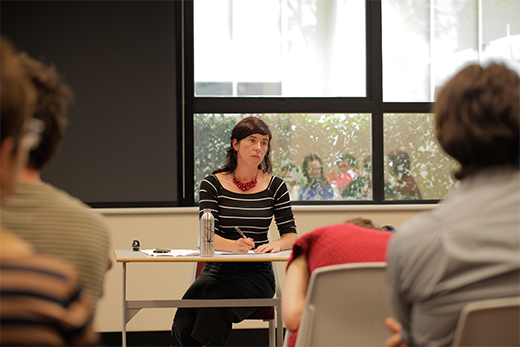 Presenter: Jessica Whyte
Presenter: Jessica Whyte
Abstract:
In 1981, Foucault delivered the statement "Confronting Governments: Human Rights" at the UN in Geneva. Addressing "all members of the community of the governed", he argued that the "suffering of men", too often ignored by Governments, grounds a new right to intervene. In this period, he worked alongside Bernard Kouchner (then head of Médecins san Frontieres/Médecins du Monde, and, until recently, France's Foreign Minister) who is credited with playing a central role in the development of the norm of humanitarian intervention. This paper suggests that Foucault saw the new activist humanitarianism of the 1970s as heralding the possibility of a new form of right liberated from sovereignty. It examines the tensions of this position, and traces the movement of the "right to intervene" from a right available to NGOs and those Foucault termed "private individuals", to a new legitimizing doctrine for state militarism. The distance travelled by this new right is indicated by Foucault's refusal, in1983, to sign a petition calling for France to take action against Colonel Gaddafi of Libya. Justifying this refusal, Foucault made clear that he did not want to be seen to be calling for war. Today, in the wake of a war in Libya that was justified as a humanitarian intervention, this paper argues that Foucault's earlier argument that discourses of right serve as masks for power is worthy of further consideration.
Bio:
Jessica Whyte is a lecturer in cultural and social analysis at the University of Western Sydney. She has published widely on contemporary continental philosophy, sovereignty, and human rights. Her PhD on the political thought of Giorgio Agamben was awarded in 2010. She is a co-editor of the Theory and Event Symposium "Form-of-Life: Giorgio Agamben, Ontology, Politics" (2010) and of The Agamben Dictionary (Edinburgh UP, 2011). Her current research is on Michel Foucault's contribution to the emergence of the 'right to intervene', and on its transformation into a legitimizing discourse for state militarism.
To listen to this paper use the audio player below. You can also download the audio onto your computer.
Dimitris Vardoulakis, "Rebel, Saint or Unexceptional? Coetzee's Michael K." (7th March)
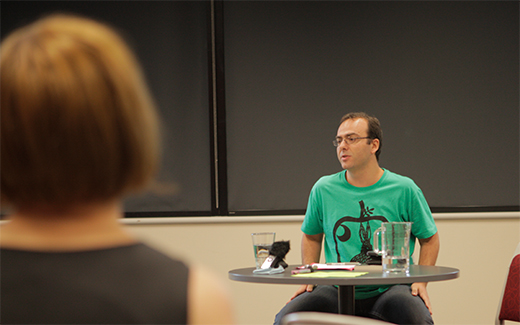 Presenter: Dimitris Vardoulakis, UWS
Presenter: Dimitris Vardoulakis, UWS
Abstract:
In this presentation I will consider how Michael K., Coetzee's re-working of Heinrich von Keist's famous rebel, Michael Kohlhaas, can be understood as a biopolitical subject. I read Michael K. in relation to the theory of racism that Foucault puts forward at the end of his lectures Society Must be Defended. I will argue that traces of older configurations of power, both ancient and modern, are still present in the novella, turning it into a meditation on sovereignty.
Biography:
Dimitris Vardoulakis (UWS) is the author of The Doppelgänger (Fordham University Press, 2010) and the editor of Spinoza Now (University of Minnesota Press, 2011).
To listen to this paper use the audio player below. You can also download the audio onto your computer.
Mobile options:

